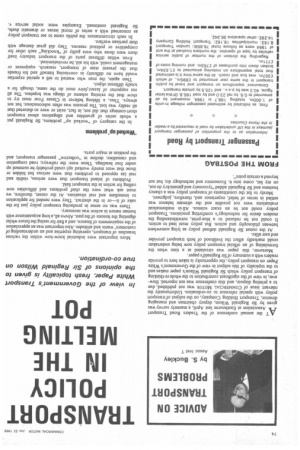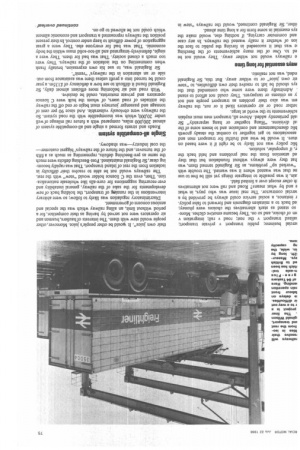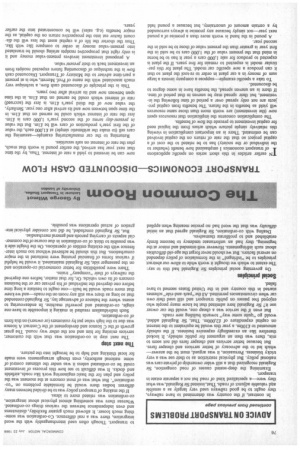TRANSPORT POLICY IN THE MELTING POT
Page 76

Page 77

Page 78

If you've noticed an error in this article please click here to report it so we can fix it.
In view of the Government's Transport White Paper, fresh topicality is given to the opinions of Sir Reginald Wilson on true co-ordination. AT the annual conference of the Traders Road Transport Association at Eastbourne last April, a masterly survey was given by Sir Reginald Wilson, deputy chairman and managing director, Transport Holding Company, on the subject of transport policy with special reference to co-ordination. Unfortunately the relevant issue of COMMERCIAL MOTOR was not published, due to a printing dispute, and this Conference was not reported. However, in view of the significant contribution to the whole re-thinking of transport policy which Sir Reginald Wilson's paper makes and to the topicality of this subject in view of the Government's White Paper on transport policy, the opportunity is taken here to provide readers with a summary of Sir Reginald's paper.
Moreover, this paper was circulated at a time when the formulating of an official transport policy now being undertaken could markedly affect the livelihood of both transport provider and user alike.
At the outset Sir Reginald defined policy as lying somewhere between philosophy and action. But policy must lead to action. It could not be reduced to a blue-print, notwithstanding the modern desire for technology's comforting precisions. Transport policy could not be an exact science. All-in mathematical evaluations were not possible and the ultimate balance was settled in terms of belief, experience and, therefore, judgment.
Merely to list the constituents of transport policy was a chancy business and Sir Reginald added "tycoonery and gimmickry do not, on my list, come into it. Economics and technology do; but not beyond a certain point". More important were industrial know-how within the various branches of transport, operating expertise and an understanding of customers' wants and attitudes. Also important was an appreciation of the requirements of finance, and a flair for seeing the future whilst digesting the lessons of the past. Above all. a long acquaintance with human nature in action was necessary.
There was no sense in producing transport policy just for the sake of it—or in the abstract. They were needed for application to immediate and real situations. At the outset, therefore, we must ask what were the chief problems and difficulties now calling for action in the transport field.
Problems of inland transport that were serious, visible and real (as opposed to problems that were serious but hidden or those that were merely worked up) could probably be summed up under four headings. These were: the railways; road congestion and casualties; decline in "collective" passenger transport; and the position at major ports.
'Worked up' problems In the category of "worked upproblems, Sir Reginald put a whole series of grumbles and allegations about transport short-comings that did not, in fact, exist or were so distorted that all reality was lost. The process was often subconscious; but not always. Thus, a lifelong believer in Clause Four must try to show that the existing scheme of things was hopeless. The all out supporter of lassezfaire must do the same, though for a totally different object.
Then again, the man who wanted to sell a special expertise would have no difficulty in convincing himself and his friends that the present state of transport, research, equipment or management could, with his aid, be revolutionized.
Even within different parts of the transport industry itself there were those who were guilty of "knocking" each other for competitive or political reasons. They did great damage with their partisan warfare.
In such circumstances the public came to see transport policy as concerned with a series of moral issues or dramatic duels, Sir Reginald continued. Examples were: social service v. iercial business; public transport v private transport; ialized transport v the rest; road v rail; integration v nn of choice, and so on. They became emotive cliches. Moreso stated as stark alternatives the choices were phoney; ed back to a mistaken diagnosis and forward to false policy. r instance, a social service could always be provided by a iercial contractor. The real issue was who pays, in what e and by what means? Road and rail were not alternatives .:11 other except over a limited field.
Ain, it was possible to integrate things yet still be free to use ne that was wanted where it was wanted. The trouble with "worked up" problems. as Sir Reginald termed them, was hat they were always without foundation but that they ed attention from the real problems and held back the ▪ if unpopular, solution.
blic policy was not likely to be right if it were based on iture. It would be wise and fruitful for transport men and associations to get together to combat the steady growth blic disenchantment and confusion and to lessen some of the al divisions. "Hang together or hang separately" Sir raid pertinently added. Above all, transport men must explain achievements to the world at large.
iether road or air operators liked it or not, the railway ern was also their problem as transport people and not y as citizens or taxpayers. They could not afford to stand . Admittedly there were some who contended that the ays should be left to resolve their own difficulties, to "stew eir own juice" or to wither away. But this, Sir Reginald :nded, was not realistic.
says essential for long time
e railways would not wither away. They would not be ed to. One of the many achievements of the Beeching re was that it succeeded in forcing the public to face the ion of whether it really wanted the railways. In any case and commuter carrying, if nothing else, would make the ays essential in some form for a long time ahead.
:ither, Sir Reginald continued, would the railways "stew in their own juice". It vould be other people's juice. Moreover, other people would stew with them. The interests of hauliers, busmen and air operators were not served by having as their competitor, for a period without limit, an ailing railway which was the special and anxious concern of government.
Discriminatory regulation was likely to follow; so were abitrary interventions in the running of transport, the holding back of new developments for the sake of the railway, general instability and ever-recurring suggestions for cure-ails like wholesale nationalization. Then, even the C licence holder would "stew" with the rest.
The railways would not be able to resolve their difficulty in isolation from the rest of inland transport. That was rapidly becoming clear, Sir Reginald maintained. Post-Beeching deficits were much the same as pre-Beeching deficits, representing as much as a fifth of the turnover, and the future of the railways' biggest customer— the coal industry—was shadowy.
Single all-compatible system
Roads and streets formed a single and all-compatible system of almost 200,000 miles, compared with a future rail mileage of well under 20,000, which was incompatible with the road system. So the railways were obviously vulnerable. And since 90 per cent of tonnage and passenger journeys must begin or end off the railway the attitudes of road users, of whom the bulk were C licence operators and private motorists, could be decisive.
With road and air beaoming more efficient almost daily, Sir Reginald found it difficult to see how a deficiency of £135m. a year could be turned into a profit unless there was assistance from outside or an alteration in the railways' "remit".
Sir Reginald was, to use his own expression, brutally frank when commenting on the isolation of the railways. They were too much a closed society. That was bad for them. They were a single, defensively-integrated and all-too-solid mass within the body economic. That was bad for everyone else. They were a great aggregation of power difficult to keep under control. In their present position the railways represented a transport and economic ailment which could not be allowed to go on.
in contrast, if the country was determined to have railways, they ought to be good railways used very largely as a sensible and valuable adjunct of roads. That, insisted Sir Reginald, was what they were—a specialized kind of road but not a separate estate in transport.
Examining the deep-seated causes of road congestion, Sir Reginald recognized that a still wider ownership of private cars was national policy. But physical restriction as to their use was a very tricky business. Persuasion, it was argued, must be the answer— which led to the advocacy of better services and cheaper fares.
But because better services and cheaper fares did not seem to mix, there was then an argument for public subsidy. It looked therefore like an exceedingly expensive business. If the subsidy amounted to £100m. a year this would be equivalent to the interest on capital expenditure of £2,000m. That, Sir Reginald added. would go "quite some way" towards building new roads.
But even if the service was a cheap one, would the car owner use it? Sir Reginald here admitted that he knew many people who enjoyed free passes on public transport and still used their own car when circumstances permitted. All the "park-and-ride" schemes started in this country and in the United States seemed to have failed.
Social principles
On governing social principles Sir Reginald had this to say: The extent to which we thought it worth while to allow our abstract principles to be "infringed" in the formulation of policy depended on several factors. But we should never forget the age-old difficulties about such infringements. However well-intended and minor at the beginning, they had an unfortunate tendency to become firmly established and to proliferate themselves.
Dealing with co-ordination, Sir Reginald agreed that an initial difficulty was that the word had no precise meaning when applied to transport. Though often used interchangeably with the word integration, there was a real difference. Co-ordination was something much looser. It allowed much greater flexibility, distinctness and even independence between the various things co-ordinated. Whereas there was something almost physical about integration, co-ordination was related more to ideas.
If the making of transport policy was to be divided between many different bodies there would be formidable problems on "coordination". But what was of most concern at the moment was the policy and plan for the basic engineering work like roads, airfields and docks. It was difficult to see how this process of investment could be co-ordinated unless it was under the ultimate control of some national authority, even though arrangements were made for local thinking and help to be brought into the picture.
The next step
The next step in co-ordination was that with the customer; services existing for him and not the other way round. The great growth of the C licence and development of the Contract A licence was due to the high value put by customers (or owners) on this form of co-ordination.
Such individualism resulted in making it impossible to have one single, co-ordinated and powerful machine. In endeavouring to assess where the balance of advantage lay, Sir Reginald contended that so long as there was still any room on the roads—and we knew that more roads would be built—one ought to hesitate a long time before one deprived the individual of his private car or the business concern of its own vehicle. Or, for that matter. before one deprived the railways of their "company" trains.
There were possibilities for better commercial co-operation and on the passenger side, Sir Reginald maintained, it would be helpful if various forms of financial pruning were instituted in the major conurbations. But this should be achieved without too much interference with the existing entities of operations. On the freight side it was possible to think of co-ordination in due course of the commercial aspects of carrying parcels and general merchandise.
But, Sir Reginald concluded, he did not consider physical integration of actual operations was possible.
























































































































